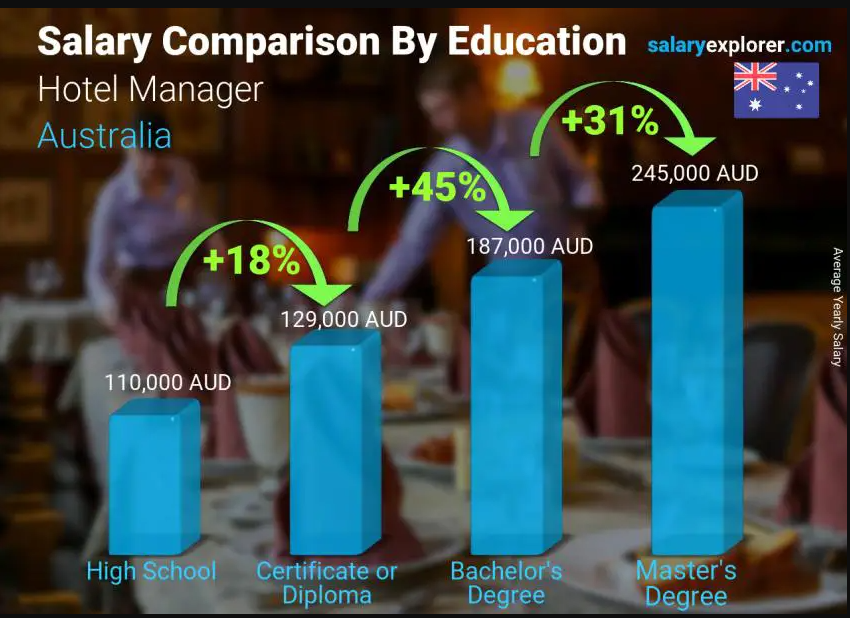Many students studying in Australia chooses entry-level positions in the hospitality industry for their part-time employment. This trend is driven by the continuous growth of restaurants and hospitality organizations in the country. Consequently, the demand for entry-level staff, such as waiters/waitresses, is steadily increasing.
Employers in restaurants and cafes find it relatively easy to train employees to become skilled wait staff, allowing them to hire candidates without extensive work experience or qualified certificates. However, from the employees’ perspective, relying solely on five or ten years of experience as a waiter/waitress or kitchen hand may not lead to significant income growth. Therefore, holding a Diploma or Advanced Diploma in Hospitality Management can qualify individuals for a variety of managerial and supervisory positions within the hospitality industry.
What are higher-level positions in hospitality industry?
Here are some significant job titles that can be considered as the higher-level positions when you work for a hospitality organisation:
- Hotel Manager: Responsible for overseeing all aspects of hotel operations, including guest services, accommodation, food and beverage, and facilities management.
- Restaurant Manager: Manages the day-to-day operations of a restaurant, including staffing, customer service, budgeting, inventory management, and marketing.
- Food and Beverage Manager: Oversees the food and beverage department of a hospitality establishment, including restaurants, bars, cafes, and banquet facilities.
- Event Manager: Plans, organizes, and executes events such as weddings, conferences, meetings, and parties, ensuring smooth operation and customer satisfaction.
- Catering Manager: Manages catering operations for events, functions, and special occasions, including menu planning, staffing, logistics, and client relations.
- Resort Manager: Oversees the operations of a resort or leisure complex, including accommodations, recreational facilities, food and beverage outlets, and guest services.
- Front Office Manager: Manages the front desk and guest services of a hotel or resort, including reservations, check-in/check-out procedures, and concierge services.
- Venue Manager: Manages the operations of venues such as bars, clubs, entertainment venues, or function centers, ensuring compliance with regulations and delivering exceptional customer experiences.
- Accommodation Manager: Oversees the management of accommodation facilities such as hotels, motels, serviced apartments, or holiday parks, ensuring cleanliness, comfort, and guest satisfaction.
According to Salary Calculator Australia, the average salary for these positions’ ranges from approximately $50,000 to $90,000 AUD annually. Specifically, a hotel manager’s salary can reach up to $250,000, depending on factors such as the size and location of the hotel, level of education, and other personal qualifications.

(Source: Hotel Manager Average Salary in Australia 2024 – The Complete Guide (salaryexplorer.com))
How to excel the better jobs in hospitality industry?
Gain Relevant Qualifications: Obtain formal qualifications in culinary arts or hospitality management from a reputable institution. Completing a Certificate III or IV in Kitchen Management/ Commercial Cookery or a Diploma in Hospitality Management can enhance your credentials and employability.
Gain Practical Experience: Gain hands-on experience through internships, apprenticeships, or entry-level positions in restaurants or hospitality establishments. Practical experience is highly valued in the industry and can help you develop essential skills and industry knowledge.
Network: Build a strong professional network within the hospitality industry. Attend industry events, join professional associations, and connect with chefs, managers, and industry professionals. Networking can help you discover job opportunities and gain insights into the industry.
Update Your Resume and Cover Letter: Tailor your resume and cover letter to highlight your relevant skills, qualifications, and experience. Emphasize your culinary expertise, leadership abilities, and any achievements or awards in the industry.
Apply for Jobs: Search for job openings in restaurants through online job boards (Seek, Indeed), hospitality industry websites, and networking contacts. Apply for positions that align with your skills and career goals and customize your application for each job opportunity.
Prepare for Interviews: Be prepared for interviews by researching the restaurant, understanding its menu, concept, and values. Showcase your passion for cooking, leadership abilities, and willingness to contribute to the success of the restaurant during the interview.
Obtain Necessary Certifications: Ensure that you have the required certifications and licenses to work in the hospitality industry in Australia. This may include food safety certifications and responsible service of alcohol (RSA) [1] certification, depending on the role and state regulations.
Be Persistent and Patient: Landing a job in the competitive hospitality industry may take time and persistence. Stay motivated, continue to improve your skills, and seize opportunities for professional development to enhance your employability.
[1] What is the Responsible Service of Alcohol (RSA) certification? Do you need it when working in hospitality industry?
In Australia, the requirement to obtain a Responsible Service of Alcohol (RSA) certification depends on the specific job role and responsibilities within the hospitality industry. While holding a Diploma in Hospitality Management demonstrates a higher level of knowledge and skills in hospitality operations and management, it does not automatically qualify you for an RSA certification.
However, many hospitality management positions may involve responsibilities that require RSA certification, particularly if the role involves overseeing the service of alcohol or managing licensed venues. Additionally, some employers may prefer or require candidates to hold RSA certification as part of their hiring criteria.
Therefore, it’s essential to research the specific job requirements and regulations in your state or territory to determine whether RSA certification is necessary for the positions you’re interested in pursuing. If RSA certification is required or preferred for your desired roles, you can typically obtain it through accredited training providers offering RSA courses in your area.
In conclusion, these roles typically require strong leadership, communication, problem-solving, and organizational skills, along with a thorough understanding of hospitality industry standards and regulations. Additionally, practical experience through internships, work placements, or entry-level positions can enhance employability in these managerial roles. Hence, making a decision of where you should study to get a diploma/ advance diploma of hospitality management is very important, it must ensure that all skills and practical experiences will be provided to students.


